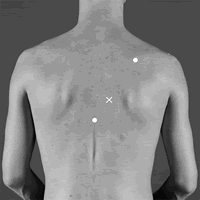|
Muscle
|
||
|
Name
|
Trapezius
|
|
|
Subdivision
|
Trapezius Ascendens (lower)
|
|
|
Muscle Anatomy
|
||
|
Origin
|
Spinous processes of sixth to twelfth thoracic vertebrae.
|
|
|
Insertion
|
Apex of spine of scapula.
|
|
|
Function
|
With the origin fixed: stabilization (together with
descending fibers) of the adduction of the scapula (performed chiefly
by the transversal fibers).
Rotation of the scapula so the glenoid cavity faces cranially (performed together with the descending fibers with stabilization by the transversal fibers). In addition the ascending fibers depress the scapula. |
|
|
Recommended sensor placement procedure
|
||
|
Starting posture
|
Erect sitting, with the arms hanging vertically.
|
|
|
Electrode size
|
Maximum size in the direction of the muscle fibers:
10 mm.
|
|
|
Electrode distance
|
20 mm
|
|
|
Electrode placement
|
||
|
- location
|
The electrodes need to be placed at 2/3 on the line
from the trigonum spinea to the 8th thoracic vertebra.
|
|
|
- orientation
|
In the direction of the line between T8 and the
acromion.
|
|
|
- fixation on the skin
|
(Double sided) tape / rings.
|
|
|
- reference electrode
|
On the proc. spin. of C7 or on / around the wrist.
|
|
|
Clinical test
|
Take care that the elbow extensors and shoulder
muscles give necessary fixation to use the arm as a lever in this
test. Depression, lateral rotation of the inferior angle, and adduction
of the scapula. To obtain this position of the scapula in order
to place emphasis on the action of the ascending fibres and to obtain
leverage for the test, the arm is placed diagonally overhead with
the shoulder laterally rotated. Apply pressure against the forearm
in downward direction.
|
|
|
Remarks
|
The SENIAM guidelines include a separate sensor
placement procedure for the trapezius descendens and trapezius transversalis
muscle.
|
|
